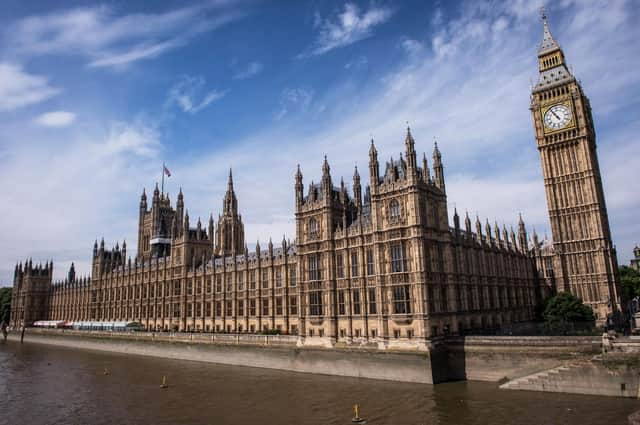Ben Lowry: Unionists need to reject the Windsor Framework and think how best to go forward


Calls for clarification have begun to seem increasingly ridiculous. The implication is that a little bit of tinkering with the agreement might make it OK. It suggests that the fundamentals of a border in the Irish Sea might not in fact be in place, when it is clear that they are, and when it is clear that there was no negotiation to remove the primacy of EU laws over this part of Northern Ireland.
As a newspaper, we warmly welcomed the easements in the border and argued strongly for the Ulster Unionists and the DUP to take their time examining the detail. Unionists are always depicted as wreckers and a swift rejection would play to that image. As an example, this web version of this article embeds a tweet (below) with has a clip in which I was grilled on the BBC whether or not as editor I would be helping the DUP to support the deal or giving support instead to Jim Allister.
Advertisement
Hide AdAdvertisement
Hide AdI stand by my answer in that, in which I explained that even moderate unionists have grave concerns about the Irish Sea border. But I have become increasingly convinced that for unionists to support the Windsor Framework would be a major failure to stand up for core principles, and would be cited in perpetuity as proof that unionists accept the claim that there is no internal frontier. In any event Chris Heaton-Harris slapped down the DUP request for clarification after the massive Westminster vote for the deal, saying that the party had “yet to come to terms with the significance” of that result.
Mixed signals from both the UUP and DUP have helped ensure that Tory MPs who were very uneasy with the modified protocol voted for it. Why would they enrage their whips by opposing something if they can see that unionists feel that mere clarification is needed, and that unionists are paying little heed to hauliers like Paul Jackson and Peter Summerton (who with increasing exasperation are making clear that the border will cause irreversible harm to the supply chain, see links below)?
The time has come to make clear that no unionist can possibly accept such a major internal UK barrier, and move on to how we can seem constructive about the future. A thoughtful unionist told me the other day that he was unsure if he had the energy to spend the next 13 years trying to recover from the Irish Sea border disaster in the same way that unionists took that long to make a partial recovery from the Anglo Irish Agreement (AIA) disaster of 1985. But however intimidating it all might seem, we need to retain hope that just such a partial recovery is possible in the medium to long term.
The new divide within unionism is going to be between those who support Stormont and those who think it so bad for the Union that direct rule is better regardless of government threats of an increased say for Dublin. I supported the Belfast Agreement of 1998, as did this newspaper, but Robert McCartney on pages 14 and 15 today (see link below) makes a powerful case that it has been very bad for unionism. I do now have an increased appreciation of the long years of direct rule from 1972 to 1998, when even the Labour secretaries of state Merlyn Rees and Roy Mason made clear that terrorism would not win concessions. Also the period after 1985 when the Tory governments of Margaret Thatcher and John Major realised that they had made a mistake in the AIA, and had been naive to expect the Irish authorities to help them fight the IRA. Stubborn extradition refusals ensured that many border Protestants were massacred and in return London ensured that there was little change in governing NI under the AIA.
Advertisement
Hide AdAdvertisement
Hide AdI am of the cohort of the population that was born at the height of the Troubles, in 1971-72, and so we were at the vanguard of the post normalisation generations. When the refurbished Opera House opened in 1980, for example, every school across the Province knew that Belfast city centre was no warzone and that it was safe to take bus loads of children there (I remember seeing performances such as Hiawatha there as a boy).


In fact, as early as 1978 the callous-sounding UK policy of achieving an ‘acceptable level of violence’ had already been a success. While almost 300 people died on Northern Ireland roads that year, far fewer – 82 – were killed in the ‘conflict’. I do not seek to undermine the immense trauma of the Troubles by making such a point. But I do think it is worth considering a parallel universe in which the UK had continued to refuse to negotiate with terror, and wonder if in that scenario the Provisional IRA would long ago have dwindled to little more than the dissidents of today. But there would have been much less of the cross-border political advance of Sinn Fein.
We are told that the suspension of Stormont is a crisis for public services and yet the assembly failed abjectly in its handling of major policy areas such as health, refusing to heed the 20-year old advice to experts to reform hospital provision. Direct rule ministers would be much better at forging ahead with NHS upgrades. The 2002 to 2007 direct rule by the then Labour government was not so bad.
There is no denying, however, that even a Conservative and Unionist government has made clear that it will not bring in such direct rule. There are great risks for unionists in long suspension.
Advertisement
Hide AdAdvertisement
Hide AdIf unionists reject the deal and reject the multiple, often low-level concessions to Irish nationalism it should not be done in sour way. Rather it should be done by calmly explaining to people (starting with President Biden) why we feel the Belfast Agreement has over time been implemented as if it is, as republicans say, ‘a process’ with one ultimate outcome.
The 2020 deal to restore Stormont saw the then secretary of state Julian Smith reward SF blackmail over the Irish language, tear up the three strands and give the IRA just what it wanted on legacy – a pledge to implement structures that Sinn Fein believed will destroy the security forces. There was barely a squeak from unionists. We cannot be so defeatist – and it is time for London to support unionists.
• Ben Lowry (@BenLowry2) is News Letter editor
Letter from Peter Summerton: We hauliers know there’s a border in the Irish Sea, as do politicians
Advertisement
Hide AdAdvertisement
Hide AdRobert McCartney: Now we can see that peace rests on shaky foundations, and that Stormont has been a disaster
Ben Lowry March 25: It has been a winding and complex route to defeat for unionists
Ben Lowry March 18: Hauliers have helped to harden some unionist politicians against Windsor deal
Ben Lowry March 11: Unionists have not been alone in not wanting Sinn Fein at the helm